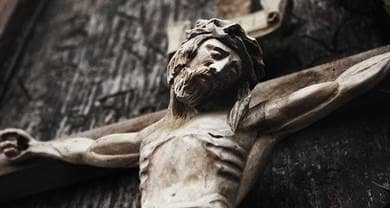- Trending:
- Pope Leo Xiv
- |
- Israel
- |
- Trump
- |
- Social Justice
- |
- Peace
- |
- Love

RELIGION LIBRARY
Roman Catholicism
Afterlife and Salvation
In Catholic Christian understanding, all of human history is geared toward salvation. Humans are trapped by their own sinfulness in bondage to death, but God became incarnate in Jesus and broke the bondage, allowing those who believe in Christ to be saved from their fate of death. Salvation is a gift from God, given not as payment for good actions but as freely given grace.
Unlike some Christian groups who focus on individual election, the idea that God chose in the beginning of time those persons who would be granted salvation, Catholics believe in corporate salvation. This refers to the belief that God grants salvation through the medium of the Church to all who participate in it. Catholics have long affirmed that there is no salvation outside the Church and traditionally this has been understood to mean that all those who are not in communion with the Catholic Church cannot be saved. More recently, though, the understanding of what is means to be outside the Church has shifted: Catholics believe that the Church is the sign of God's presence in the world, that all those who come to God do so through the medium of the Church even when they themselves do not recognize the Catholic Church's role in their salvation.
Catholics see a close connection between salvation and atonement, which is the way that God comes to forgive human sin through the actions of Jesus the Christ. Many theories have been proposed about how this happens, but the two most influential in Catholic understanding are that Christ paid a ransom to Satan and that Christ offered himself as a substitute to God. A number of writers in the early Church, especially Origen (185-254), talked about the atonement as a ransom; they believed that humans were in bondage to Satan, deserving death because of their sins. Since Jesus lived a perfect and sinless life, he owed nothing to Satan but allowed himself to suffer death anyway, ransoming the souls of all of humanity by breaking Satan's claim to own them due to sinfulness. St. Anselm (1033-1109) gave the classic formulation of the substitution theory. He said that humans owe God a perfect life but are unable to deliver it because of their sinfulness. God became incarnate in Jesus and lived a perfect life, meaning that he owed nothing more to God, but he freely chose to accept death. With this action he created such a surplus of obedience and honor that he repaid to God all that humans had been or would be unable to pay. Thus he substituted his obedience for their sinfulness.
Atonement allows God to grant salvation to humans who are not in themselves worthy of it. Salvation is experienced in this life as a reweaving of the human-divine relationship that was broken with sin, and beyond death as a new life lived in communion with God in heaven.
In traditional Catholic understanding, the human retains individuality beyond death and goes on to experience one of three states of being: heaven, purgatory, or hell. Heaven is the place of perfect peace and joy, a place where humans join the angels in having direct knowledge of God and praising God through eternity. It is the hope and desire of all Catholics to reach heaven and exist in this perfection, but they generally believe that most souls are not cleansed enough of sin in this lifetime to be ready for heaven and instead will enter an interim state called purgatory.
Purgatory is, as its name suggests, a place of purgation. Christ's death may have opened the way for humans to receive salvation and attain heaven, but their souls are still warped by the sins they have committed. In order to purify their souls, humans pass through purgatory, where they endure severe punishment and in the process become cleansed of sin and its ill effects. All humans who enter purgatory will eventually pass from it into heaven, but they will spend differing amounts of time in the purgatorial fire depending on how warped their souls became due to sin.
The souls of those who are too corrupted with sin and who continue in disobedience to God until death cannot be cleansed even in the fires of purgatory and will instead choose hell. Hell has traditionally been thought of as a place of unending torment but is now more commonly seen as the state of being totally removed from the goodness of God's presence. Theologians today talk about the suffering of souls in hell less in physical and more in psychic terms: the soul's endless sorrow at an eternity spent away from the source of all good and truth, with no possibility of a reprieve.Study Questions:
1. What is corporate salvation?
2. Why is the Church, as opposed to the title “Catholic,” crucial for salvation?
3. How do Catholics understand atonement?
4. What is purgatory? Is it a final destination for Catholic souls?










